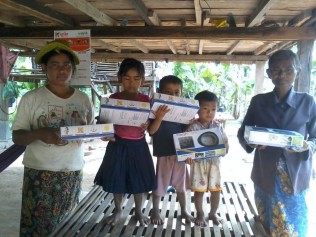
In many rural villages across the world, people rely on kerosene lamps after dark — lighting that is toxic, nonrenewable, and hazardous. But a variety of forward-thinking companies and NGOs are enabling some communities to leapfrog right over traditional electrical power and light their homes with solar energy.
In Cambodia, for example, only 13 percent of households currently have access to electricity, according to the Council for the Development of Cambodia. Thanks to the nonprofit One Degree Forward and solar-powered lanterns called MoonLights, students in the village of Samrong, 45 kilometers from Siem Reap, now have sustainble lighting.
Developed by the solar energy company Kamworks, MoonLights are manufactured in Cambodia, creating jobs for the local economy. They sell for retail of USD $15, and in some areas can be rented from Kamworks for about USD $.08 per day, approximately the same cost as a day’s supply of kerosene. Kamworks also offers professional and home solar systems and has partnered with micro-financing institutions to make them affordable for villagers. While most MoonLights are sold commercially, a few NGOs including One Degree Forward have formed initiatives to install them in rural areas.
Laim Len, one of the students sponsored by One Degree Forward, is an enterprising and altruistic 23-year-old medical student who founded the Samrong Village School of Opportunity in his hometown of Samrong. Earlier this year, a fundraising initiative culminated in One Degree Forward installing a solar system to light the school’s two classrooms. One Degree Forward has also donated 135 lights to the approximately 500 residents of Samrong.
After visiting the school with Len, the Ellisons provided funds for a teacher’s salary, school supplies, and the installation of a concrete floor and new bamboo walls. In April of this year, a fundraising initiative culminated in their installing a solar system to light the school’s two classrooms.
While researching solar systems for the school, Tim discovered Kamworks and the MoonLights, and in December 2013, One Degree Forward donated 135 lights to the residents of Samrong. Most of the lights are portable with a rope attached so they can be worn around the neck or hung on a wall.
One Degree Forward has also donated 10 MoonLights to the Sala Monkey School in Kep, 150 kilometers south of Phomn Penh. The organization plans to provide more MoonLights in other villages, and donations are welcomed at OneDegreeForward.org.
Similar initiatives are under way in many other low-income countries. In Rwanda, NGO Safer Rwanda has partnered with local leaders to bring solar lighting to parts of the Musanze District in the country’s Northern Province. Four local women were chosen for a three-month training program in solar installation and maintenance, and they now provide ongoing support to their community.
In Uttar Pradesh, India’s most populous state, up to two-thirds of residents lack consistent electricity. But, over 200 NGOs, donors, entrepreneurs, and investors are working on developing rural off-grid power, mostly through solar initiatives. Some are installing solar panels on rooftops and running wires to nearby homes. Others, such as the Omnigrid Micropower Company, are building solar plants, selling power to local households, and renting charged lanterns, fans, and battery boxes for powering mobile phones and other devices.
Chicago-based company, Greenlight Planet, has sold 1.8 million solar lamps in rural India and East Africa since its inception in 2009. They produce four different lamp models, manufactured in China, which range in price from USD $11 to USD $40.
Many sources report that these initiatives are making a tremendous impact on villagers’ lives. Following the installation of the lights in Samrong, Laim Len sent a letter to One Degree Forward enthusiastically thanking them for the donation. “MoonLight is [the] best tool for children to study.”
Read Ethical Traveler's Reprint Policy.
